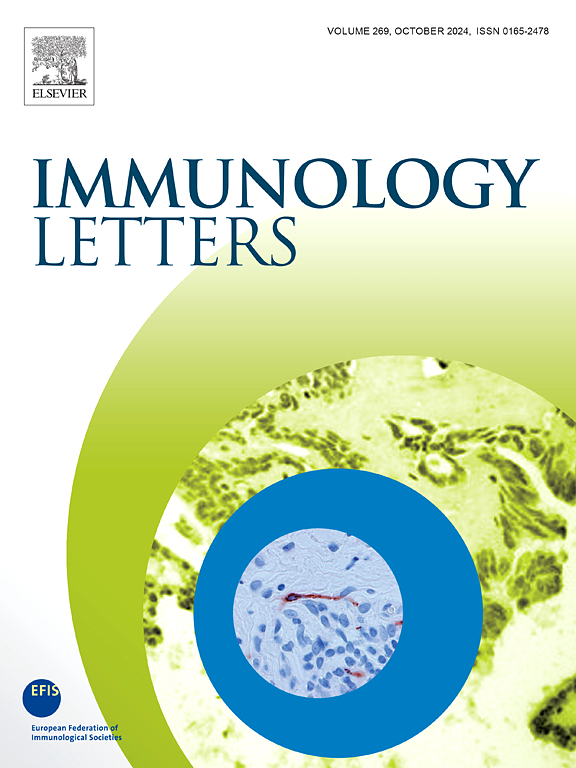Fatty acid binding protein 2 (FATP2/SLC27A2) blockade with Lipofermata elicits dual effects on inflammatory responses in human monocytes and macrophages
IF 2.8
4区 医学
Q3 IMMUNOLOGY
引用次数: 0
Abstract
Inflammatory responses often involve metabolic rewiring within immune cells to support effector functions. Targeting metabolic pathways in immune cells therefore represents a promising strategy to modulate inflammatory diseases and improve therapeutic outcomes. Acyl-CoA synthesis by fatty acid transporter 2 (FATP2/SLC27A2) facilitates the transport of long-chain fatty acids into the cell. It represents a key step in fatty acid metabolism and the subsequent production of bioactive lipid mediators (LMs) with immunoregulatory functions. While the FATP2 inhibitor Lipofermata is currently evaluated for lipid-lowering therapies in metabolic diseases, and to revert the suppressive nature of myeloid cells in cancer, its effect on inflammatory responses in human macrophages remains elusive.
Here, we show that Lipofermata reduced LPS-induced inflammatory responses in whole blood and human monocytes. This anti-inflammatory effect was paralleled by a decreased biosynthesis of arachidonic acid-derived inflammatory LMs, including prostaglandin E2 (PGE2) and thromboxane 2 (TxB2). These findings suggest an anti-inflammatory effect mediated by Lipofermata-mediated redirection of lipid metabolism in monocytes.
Conversely, in mature human monocyte-derived macrophages, Lipofermata treatment enhanced LPS-induced cytokine production and induced cell death, likely through inflammasome activation. Together, these results underscore the cell type-specific effects of FATP2 inhibition and highlight the dual role of Lipofermata in modulating inflammatory immune responses. As such, targeting lipid metabolism with Lipofermata could have therapeutic potential with both anti- and pro-inflammatory applications, depending on the target cell type and context.
脂fermata阻断脂肪酸结合蛋白2 (FATP2/SLC27A2)可对人单核细胞和巨噬细胞的炎症反应产生双重影响。
炎症反应通常涉及免疫细胞内的代谢重新布线,以支持效应功能。因此,靶向免疫细胞中的代谢途径代表了一种有希望的策略来调节炎症性疾病并改善治疗结果。脂肪酸转运蛋白2 (FATP2/SLC27A2)合成酰基辅酶a促进长链脂肪酸转运到细胞内。它是脂肪酸代谢和随后产生具有免疫调节功能的生物活性脂质介质(LMs)的关键步骤。虽然FATP2抑制剂Lipofermata目前被评估用于代谢性疾病的降脂治疗,并恢复骨髓细胞在癌症中的抑制性质,但其对人类巨噬细胞炎症反应的影响仍然难以捉摸。在这里,我们发现Lipofermata降低了全血和人单核细胞中脂多糖诱导的炎症反应。这种抗炎作用与花生四烯酸衍生的炎症性LMs的生物合成减少相一致,包括前列腺素E2 (PGE2)和血栓素2 (TxB2)。这些发现表明,脂fermata介导的单核细胞脂质代谢重定向介导了抗炎作用。相反,在成熟的人单核细胞源性巨噬细胞中,Lipofermata处理可能通过炎症小体激活,增强了lps诱导的细胞因子产生并诱导细胞死亡。总之,这些结果强调了FATP2抑制的细胞类型特异性效应,并强调了脂fermata在调节炎症免疫反应中的双重作用。因此,用Lipofermata靶向脂质代谢可能具有抗炎和促炎的治疗潜力,这取决于靶细胞类型和环境。
本文章由计算机程序翻译,如有差异,请以英文原文为准。
求助全文
约1分钟内获得全文
求助全文
来源期刊

Immunology letters
医学-免疫学
CiteScore
7.60
自引率
0.00%
发文量
86
审稿时长
44 days
期刊介绍:
Immunology Letters provides a vehicle for the speedy publication of experimental papers, (mini)Reviews and Letters to the Editor addressing all aspects of molecular and cellular immunology. The essential criteria for publication will be clarity, experimental soundness and novelty. Results contradictory to current accepted thinking or ideas divergent from actual dogmas will be considered for publication provided that they are based on solid experimental findings.
Preference will be given to papers of immediate importance to other investigators, either by their experimental data, new ideas or new methodology. Scientific correspondence to the Editor-in-Chief related to the published papers may also be accepted provided that they are short and scientifically relevant to the papers mentioned, in order to provide a continuing forum for discussion.
 求助内容:
求助内容: 应助结果提醒方式:
应助结果提醒方式:


